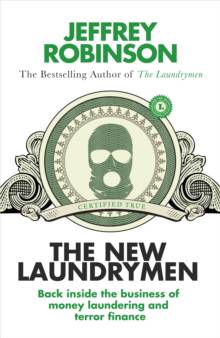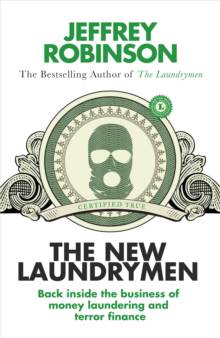
Je cadeautjes zeker op tijd in huis hebben voor de feestdagen? Kom langs in onze winkels en vind het perfecte geschenk!
- Afhalen na 1 uur in een winkel met voorraad
- Gratis thuislevering in België vanaf € 30
- Ruim aanbod met 7 miljoen producten
Je cadeautjes zeker op tijd in huis hebben voor de feestdagen? Kom langs in onze winkels en vind het perfecte geschenk!
- Afhalen na 1 uur in een winkel met voorraad
- Gratis thuislevering in België vanaf € 30
- Ruim aanbod met 7 miljoen producten
Zoeken
Omschrijving
It is almost twenty-five years since Jeffrey Robinson wrote the bestseller The Laundrymen. In those heady days of the early 1990s, the United States was cocaine saturated; white powder was pouring into Britain, the City of London was a cesspool of dirty money, and nearly $300 billion worth of ill-gotten cash was circling the globe, looking to get clean. Today the USA is still cocaine saturated, white powder continues to pour into Britain, and now more than $1 trillion worth of ill-gotten cash is circling the globe, looking to get clean.
Where did it all go wrong? Start with the City of London, which is, more than ever, a cesspool of dirty money. It began with drug money and is now awash with the receipts of political and corporate corruption. Now throw in the destruction successive governments have done to British law enforcement and Parliament's proclivity for talking a good game, but doing next to nothing to prosecute the money launderers.
Ripping the scab off Britain's dismal record when it comes to dirty money, The New Laundrymen takes readers deep inside the HSBC scandal, all over the Panama Papers (Robinson was the author who originally outed the Panamanian lawyers Mossack & Fonseca in 1998), and in to $50 million worth of drug money that sat in an account in London, until it was eventually returned to the money launderer. He explains how a blue-chip business laundered fraud money for the Italian mob and how the Commonwealth Islands live off dirty money, he sings praises for the one offshore island that decided enough was enough and he reveals why the world's dictators - from Egypt's Mubarak to Libya's Gaddafi - love London because their sons have always been welcome here to bed down the loot their fathers stole from their national treasuries. Just as he did twenty-five years ago, Jeffrey points fingers and names names, turning the spotlight on Britain's 'gatekeepers' - the lawyers, bankers, accountants, company formation agents and brokers living right here - who continue to make huge profits in the world's third largest business: money laundering.
Where did it all go wrong? Start with the City of London, which is, more than ever, a cesspool of dirty money. It began with drug money and is now awash with the receipts of political and corporate corruption. Now throw in the destruction successive governments have done to British law enforcement and Parliament's proclivity for talking a good game, but doing next to nothing to prosecute the money launderers.
Ripping the scab off Britain's dismal record when it comes to dirty money, The New Laundrymen takes readers deep inside the HSBC scandal, all over the Panama Papers (Robinson was the author who originally outed the Panamanian lawyers Mossack & Fonseca in 1998), and in to $50 million worth of drug money that sat in an account in London, until it was eventually returned to the money launderer. He explains how a blue-chip business laundered fraud money for the Italian mob and how the Commonwealth Islands live off dirty money, he sings praises for the one offshore island that decided enough was enough and he reveals why the world's dictators - from Egypt's Mubarak to Libya's Gaddafi - love London because their sons have always been welcome here to bed down the loot their fathers stole from their national treasuries. Just as he did twenty-five years ago, Jeffrey points fingers and names names, turning the spotlight on Britain's 'gatekeepers' - the lawyers, bankers, accountants, company formation agents and brokers living right here - who continue to make huge profits in the world's third largest business: money laundering.
Specificaties

Alleen bij Standaard Boekhandel
+ 37 punten op je klantenkaart van Standaard Boekhandel
Beoordelingen
We publiceren alleen reviews die voldoen aan de voorwaarden voor reviews. Bekijk onze voorwaarden voor reviews.









